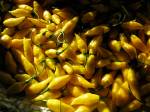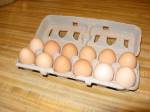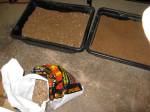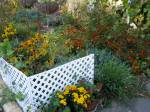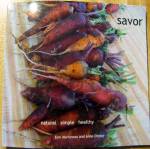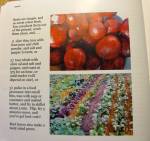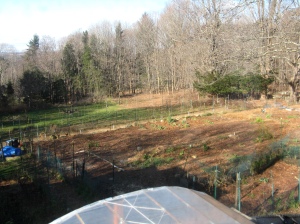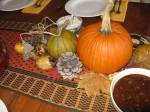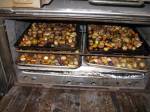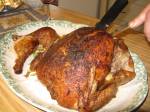Category Archives: Farm and food and sustainable living
A glorious and busy fall day on the farm
Today has been (still is, actually) incredibly beautiful—breezy, cool and sunny, a perfect autumn day in New England.
And this has been a typical day busy-wise, too:
My wish for every being is to experience the sense of delight, nurture, beauty and peace this kind of day brings. Heaven, right here on Earth.
That’s two …
Brewster the Rooster seems to be suffering from a bit of testosterone poisoning. A few days ago he apparently decided that I am another (obviously competitive) rooster, and took a run at me. Since he’s always been something of scaredy-chicken, I had my back turned and was completely unsuspecting.
Let me tell you, a bird one-fifth your size with a beak and claws can so some damage. I’m still wincing when I stand on my left leg, which is where he buried his beak just above the back of my knee.
“That’s one,” I told him. “When we get to three, it’s chicken and dumplings time so watch it.”
Since then I enter the chicken yard with a broom; not so much to whack him (though in a direct attack I’m not above that tactic), but more to discourage him and disabuse him of the idea that I am a rooster. You’d think the 5’3″, opposable thumb stuff would be a hint, but I guess not.
The next day he was fine. The third day I had Bill with me when I went to collect eggs and change their water. Naturally Brewster lolled around with several chickens in a far corner, making me look a Chicken Little tattletale. Embarrassing, but harmless.
This morning was a different story entirely. Neck feathers flaring, claws forward and testosterone-driven, the Big R came at me over and over. It was quite interesting to see, and with the broom to distract him I wasn’t hurt.
But I can’t exactly get my morning chicken duties accomplished while I’m playing Dodge the Rooster with him.
It was clear that he hasn’t forgiven me for being an interloper, and as far as he’s concerned I’m still a rooster, opposable thumb and all. Fine.
That’s two.
Exile
Tarzan is growing up, and his latest education has been focused on beaking skills.
The past two nights he has used Donald’s back for poking practice. Tarzan has unfair advantages: he’s smaller and much faster, he has a spear of a beak and can leap on Donald’s back to avoid those dangerous duck claws and pinching bill. The damage was severe enough that Tarzan has been exiled from the roaming flock of ducks and chickens to the fenced-in chicken run. Plenty of roaming room still but his companions are now 22 equally-beaked females of his own kind.
That sure evened up the odds. The two boss hens aren’t quite ready to give up their status to this interloper, so he’s learning how to be a bit more socially adept. Once he realized his advantage had disappeared, he began looking for a way out. Surely there must be a hole somewhere in this fence …
Before he realized he could easily fly out, we clipped his flight feathers. No geographic cure for this problem.
Hopefully all will be settled in the new living arrangements within a few days.
In the meantime there are occasional meetings between rooster and hen where heated discussions occur, and the social structure is being reorganized. So far, it’s Tarzan who is having to do the renegotiation. The score to date is about 5-1, advantage hens.
They’ll work it out.
Feast of the Fourth
Happy 4th of July, everyone.
My childhood memories of this holiday make it one of my favorites: a small carnival in town, great barbeque, a local parade complete with floats and the ubiquitous Shriner mini-moped brigade, fireworks and sparklers …
I know that the “freedoms” we enjoy came at a huge price for the indigenous residents of this country and for the land itself, so the celebration today is subdued and now includes attention to our faults as well as our privileges in this place. It is a day observed with both thanksgiving and with repentance.
Holding all these things in our hearts, we will complete the observance of the day with a feast of good food, mostly obtained right here on the land currently in our care. With thanks to our forebears, we appreciate the many gifts we enjoy. Here are a few shots of kitchen preparations in progress [click on an image to see the close-up view] …
The menu includes deviled eggs (fresh eggs are miserable to shell, but Rachel [one of our Fabulous Interns] did a masterful job on this bunch), filled with creamy hard-cooked yolks, freshly-made dill mayo, sweet-n-sour pickles from last year’s cukes, hot sauce from 2009 peppers, and paprika from 2009 dried Boldog. Fresh basil leaves finish the plate. Presentation is everything.
Bill made brats (sausages) last week from venison, pork and spices, which will be grilled and served with lacto-fermented sauerkraut. We’ll treat ourselves to steamed shell peas and a fresh green salad, along with potato salad made from potatoes grabbled just today (in all this heat!) from the Main Garden.
Desserts are provided by Bill, who is making vanilla ice cream served with a variety of toppings, and Rachel and Claire (our other F.I.), who are right now baking strawberry-rhubarb and peanut butter-chocolate pies.
And of course lemonade (sorry, we have to use organic lemon juice from the store — no lemon trees here … yet) will be our classic summer quencher.
If you’re not drooling now, you may actually be dead.
The most beautiful —
 Every day, several times a day, I look at the place where I live and know that it is, without doubt, absolutely the most beautiful place on Earth. Our gardens are the lushest, our flowers the loveliest, the animals and birds the most amazing, the air the freshest, the water the tastiest (and healthiest) …
Every day, several times a day, I look at the place where I live and know that it is, without doubt, absolutely the most beautiful place on Earth. Our gardens are the lushest, our flowers the loveliest, the animals and birds the most amazing, the air the freshest, the water the tastiest (and healthiest) …
Now, I know some of you out there may be feeling the same way about your own digs, and you know what? We are both right.
This is true for every one of us, and I finally figured out why. When a child is born, its parents are convinced that it is the most precious, perfect, beautiful creature ever to arrive. They have spent untold days (or weeks or months or years) dreaming about and planning for this child. Then there was that nine-month period where every change in mom’s body was noted with wonder and excitement (well maybe not so much that morning sickness part) — every flutter of the growing child a miracle, every kick of the nearly completed infant a joy to mom and dad (and probably a few other good friends and family as well).
Some folks talk and sing and play music to this emerging life. The wee one hears those voices and the bonding between parent and child is strengthened every day. When this new being arrives, hormones seal up those pre-birth connections with a strength that can never be broken.
Gardens are very much the same. Days and weeks and months of planning and seed planting precede the appearance of fragile little sprouts, which need to be fed and kept warm and get just enough—not too much and not too little—light, and the right amount and kind of nutrition.
They must be “hardened off” (just as a human child is trained to live in a world that is filled with wonders but that is also dangerous), and then finally placed in carefully prepared soil. Each plant is checked on daily, and should it need water or shade or shoring up, it gets it right away.
Seemingly ages after each being was first thought of, the plant prepares for its own next generation. Flowers show us where seeds (a tasty pea pod, or a lovely flower, the little nubbin of a pepper) have their beginning.
Our gardens are indeed the perfect gardens—for us. We imagined them, we planned them, we prepared for them, we planted them, we nurtured them. Something akin hormones seals the bond between land and human. I know of nothing that can break this connection.
Just as generations of human families carry forward their own expression of Life , our gardens develop and change and surprise us, life after beautiful life.
Our gardens are the most beautiful, precious, wonderous places. And so are yours. And yours, and yours and yours.
A Completely Biased Book Review
Full confession: all the gorgeous photos and all the great ideas in this book arose in the minds and hearts (and through the excellent photographic, culinary and literary skills) of our Companions Erin Martineau and Anne Ditzler. The book, savor: natural · simple · healthy, is a delight for the eye, a lovely window into our lives here on the farm, and a terrific help in the kitchen.
I am definitely biased.
But even with my caveat, this is a book you and your friends will adore. Helpful hints throughout encourage one to venture into the wonderful (and tasty) world of fresh foods, farmers’ markets and creative cooking.
Not exactly recipes here, but guidelines for how to use those beautiful veggies now appearing in yard gardens and organic markets around the country. Whether you use it as eye candy for your coffee table or as a quick reference for your kitchen shelf, you’ll want to buy a copy today.
And don’t forget a copy for your best friend. S/he will love it, too.
News in the wind
Six years ago our convent was a lovely retreat house surrounded by several other buildings (a small chapel, large building used for the school and convent, and a dilapidated caretaker’s house). We have a total of 20 acres on this side of the road, and most of that is second- and third-growth woodlands.
Then we began to awaken to the dilemma facing humanity and the danger facing all of Earth’s communities of life — and we realized we had to add a different, extremely demanding, and urgently necessary work our already-worthy ministries of retreats, quiet days and spiritual direction.
The Earth needs us, our vision and our skills.
So about a third of the half-acre or so of manicured lawn around the retreat house was transformed to a budding (no pun intended) vegetable garden. About a fourth of that same lawn became a firepit area surrounded by four-direction posts, and the rest was allowed to return to natural meadowland. The three life-professed sisters living here at that time moved into the retreat house and the old convent was converted into a lovely guest facility.
We began an intensive period of study, learning about biodynamic farming, permaculture, food preservation, and the wisdom of the planet which brought us into existence and nourishes us daily. We studied the Universe journey from its inception, and we studied our own religious tradition’s wisdom as an incarnate reality.
We’re still studying, growing more (and more varied) foods every year, adding animal companions to deepen our biodynamism, planting trees, saving seeds and inviting others to explore what it might look like to live happily, sustainably, simply and joyfully, and to be intensely fulfilled spiritually in the process. We’re learning how to make our own vinegar, ketchup, wine, cheese, maple sugar and yogurt; we’ve learned to spin and weave, to collect rainwater and to compost everything compostable.
We’ve discovered that our liturgy and prayer are focused and informed by the ways we are finding to live in harmony with Earth, by our experience of the sacredness of the soil and water and air, by the natural abundance of Earth and the balance that upholds it all.
And more and more people are becoming interested in what we are doing here, and why. Now there are four professed sisters and four resident companions in our little band of prayers and farmers.
We have also come to realize that the old heating, plumbing and electrical systems in this 200+-year-old farmhouse need to be renovated for safety’s sake, but they also need to be designed and constructed in ways that reflect what we are learning about sustainable, wholesome practices, and which hold future generations in deep regard.
We’ve been working with architects who understand our spiritual lives as well as our efforts toward sustainable living, and as we begin to hone in on some plans, I’ll keep you posted.
What an exciting time for us all!! If you’re anywhere near Brewster NY and would like to visit us and see what’s happening here, do let us know! As time allows and funds make some of these changes possible, I’ll be taking some before and after photos and will share more of the details of our vision for this place and for the future.
Stayed tuned!
Now I’m a chicken farmer …
… and I love it.
Every morning I head out to Cluckingham Palace, home of twenty-two red and black chickens, clad in my chicken boots and carrying whatever the needs of the day might be: empty egg cartons, cracked corn, a bag of layer pellets or a sack of shavings for the house. In the winter I’ll also need to carry down a bucket or two of water, but for now the duck hose is still connected outside, so I use that.
I’m greeted by all of the chickens that aren’t already settled in a nest for the day’s laying. They surround me, clucking quietly, knowing I’ll toss out a hefty handful of corn—their fave. I’ve come to recognize a bit of chickenese: the tiny little whirrs are egg-laying related, an ear-shattering buh-CAWK seems to be an expression of pure happiness, and a rich variety of clucks apparently do for all the rest of their communications. Those I haven’t sorted out yet.
While they are busy pecking at the corn I fill up the pellet and water feeders, collect any eggs that might have already appeared and clean out their house.
Oddly, it’s the housecleaning that is the most soothing of all. I love the chickens and enjoy their various clucks and chirps and whirrs and squawks, and four or five usually join me in the house. This work requires a five-gallon bucket, a good pair of rubber gloves and a flexible back. I have all three, thankfully.

The girls, as I think of them, hop on and off their roost bars and scratch around me as I pick up the night’s, um, leavings. By 8:00 am all five nest boxes are usually occupied; the girls who surround me are in something of a holding pattern, waiting for nesting space. Occasionally the urge to lay overrides the niceties of waiting one’s turn, causing two or even three chickens to crowd together in a single box. Apparently this is fine with everyone—they seem perfectly happy to share egg duties with each other.
The bucket is emptied either in the chicken yard, where the girls will make quick work of turning it into mulch, or into the garden where it is coveted fertilizer. Back at the Palace I spread out a bit of clean shavings over any bare spots, open the windows and head back to the house, having spent a peaceful and renewing half hour with the girls.
I’ve done this every day since the chickens came over here to live, except when I was on vacation recently. I was sure I was going to enjoy that break in my routine, but as it turned out, I missed it.
Now isn’t that strange? Missing a thirty minute poo-cleaning session every morning, rain, shine, cold, hot, sick, well? I’d don’t really understand this myself, but I suspect this work is making more than my back flexible. The simplicity of chicken life is seeping into my soul.
Well, whatever is happening out there I’m not going to worry about it … unless I begin buh-CAWKing for the pure joy of it.
And maybe I won’t worry about that, either.
Hoedown
We continually find words and phrases used commonly in today’s culture, but which had roots in our earlier lives as a people who grew their own food.
This year Thanksgiving was nearly upon us when we completed the process of putting the gardens to bed. Then it dawned on me. A hoedown originally meant just that: it was the time we put our hoes down for the winter, and that is definitely cause for great celebration.
That root meaning has all but disappeared from our dictionaries; hoedown now refers to a particularly lively country jig, often experienced at a barn dance. It makes sense, though, as putting farming tools down for a few months is a good excuse for dancing madly. I wonder if that first Thanksgiving included a hoedown dance or two, for exactly the same reason.
At our house we celebrate times of completion and change. In March it’s sugaring off (the end of gathering and processing maple sap), and right now we are enjoying the delight of hoedown. We sing and dance and give thanks for another year of rich harvest and for the promise of winter rest.
Even if you’re not a farmer of any stripe, it is good to remember that somewhere, someone is putting a hoe down after working all summer so you’ll be able to eat all winter. So sing and dance and celebrate with your farmer, wherever s/he may be!


